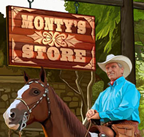Hey - I see that Monty will soon be profiling jumper horses in his October lessons. In my neck of the woods, the footing for jumper horses is grass and many horses are shod and have corks to prevent them from slipping on the manicured grass (like at Spruce Meadows), so I am told. Myself, I prefer to have my horse barefoot and I just want to ask if any of you have ever seen jumper horses perform adequately on grass without shoes and corks? I do not have experience behind me to stand up to these "oldtimers" who advocate that corks are required to prevent injury to horses. I do not want to make my horse susceptible to injury. Has anyone ever seen a jumper horse compete with boots on? I have youtubed the swiss horse boot with corks which shows a horse trotting on ice. Is this for real?
Rewards
Subscribe to Equus Online University and become a part of Monty's worldwide mission to leave the world a better place for horses and for people too.
Students automatically gain access to special rewards, such as exclusive discounts at the Monty Roberts Online Shop. Visit Monty Roberts Online Shop.




Hi EvyG,
First of all, let me congratulate you for preferring to have your horse barefoot; that’s the way nature intended horses to be, although humans often forget it for theirs own needs and goals.
You will find Mr. Roberts’s opinion on going bare in his article “The advantage of going Bare” where he relates his experience of riding six unshod American mustangs in the Rose Bowl Parade in Pasadena, California on January 1, 2003 (see: http://www.horsepoint.com.au/portal/alias__horsepointau/tabID__3435/ArticleID__1555701/DesktopDefault.aspx). Although admitting that he was “…absolutely amazed by the accomplishments both physical and psychological of these incredible animals…” Mr. Roberts soon clarifies: “I’m not saying that there is no need for shoes under any condition. That would be silly.” and further re-enforces: “I believe at the conclusion of this test that the training and competition involved in racing, eventing, show jumping, reining, cutting and many other disciplines would require the use of shoes to accomplish these disciplines.”
Mr. Robert trained many world champion horses, he was world champion many times, he is a great horseman and an even greater teacher; he deserves all my admiration, respect and sincere sympathy.
That said, in my very personal opinion, the concept expressed by Mr. Roberts in the above-mentioned article does not seam too much in line with his teaching: “The needs of the horse come before wanting to win championships …” (“A WORD FROM MONTY / Put the needs of the horse first.” – EQUUS Uni). But a barefooted horse certainly is in line with Mr. Roberts’ definition of “Natural”: “…a word used to describe those elements of life which are unadulterated” (Uni’s Forum Dec. 9th, 2009).
I personally believe that no training or competition whatever justifies the use of shoes just to accomplish whatever discipline, and I applaud to your decision of competing barefoot.
Should you not get an answer to your specific question on this forum, you may contact one of the many specialised forums or website on Internet. Here you have some suggestion:
- Ms. Jill Willis at renmgmt@earthlink.net. She is working with Jaime Jackson and she will probably be in a position to help you.
- HOOF Hotline: (530)340-HOOF (340-4663), or write to: info@marthaolivo.com. In theirs website you will also find records of barefoot horses successful in jumping competition: http://www.marthaolivo.com/articles/article21.shtml.
- You may also inquire with: http://barefooters.forumup.it/; It is an Italian Forum, but write in English and somebody will answer you.
Hope this will help.
I have no experience of horses jumping barefoot on grass, but I would like to put in that although I am all for barefooted horses whenever it is possible, it's important to remember that while Mother Nature most certainly intended horses to go without shoes, she never ever intended for them to be ridden.
.
And, yes, unshod, wild horses run around on all sorts of surfaces and jump things too, but that is not the same thing as it is safe for them to do so, or that they never injure themselves.
Plus, they don't have to carry a lump on their back while doing it. ;)
.
The moment we put weight - any weight - on their backs, we shift their balance and increase the strain on their limbs and feet - esp. the forelimbs.
Now, some breeds can cope with this just fine hoofwise, but other breeds, or individuals for that matter, have been bred "out of" their hooves and will need shoeing if they are to be used for riding at all, and we have to recognize that most people breed or keep horses for that very purpose.
.
In the concept "Put the needs of the horse first", shoeing will be one of those needs for some, and I hope all horse owners, not just the ambitious ones, will tend to these needs before they move on with their training.
.
Back to the original subject. This I know:
Moving a lot on gravel/sand/hard surfaces, shoes are needed to prevent grinding the hoofwall down too fast or too much. (A barefoot trotting race horse can come in with bleeding feet after one single race.)
While a bare hoof have better grip on a slippery surface than a shod one, studs -or corks- will give the horse a better grip for safer footing in both landing and take off over the fence to insure better confidence and jump =less risk for sprains/strain tendons, or a fall.
A shod horse should not be let to run on slick footing (ice, mud, wet grass, etc) without corks/studs.
Well said Kiki, you sure made a good point. Following what Nature intended, maybe we should not ride horses at all. But I guess that this is not the right answer to the problem and this is not the right place to go dipper into the matter, unless we would start a new topic “barefooters”, which doesn’t seam a good idea in this forum.
EvyG, here you have the answer to your question:
http://www.barehoofcare.com/katz.html
http://www.barefoothorses.co.uk/
As you may see, there are horses competing with boots on and horses competing without. Should you decide for “booths on”, I strongly suggest you to get assistance from a professional, in order to choose the right boots and correctly adjust them to your horse’s hoof. Don’t give up!
Well said Kiki, you sure made a good point. Following what Nature intended, maybe we should not ride horses at all. But I guess that this is not the right answer to the problem and this is not the right place to go dipper into the matter, unless we would start a new topic “barefooters”, which doesn’t seam a good idea in this forum.
EvyG, here you have the answer to your question:
http://www.barehoofcare.com/katz.html
http://www.barefoothorses.co.uk/
As you may see, there are horses competing with boots on and horses competing without. Should you decide for “booths on”, I strongly suggest you to get assistance from a professional, in order to choose the right boots and correctly adjust them to your horse’s hoof. Don’t give up!
Thanks for the links, Bruno!
I love to learn new things and expand whatever knowledge and views I have on this (or any other)subject.
There's always so much misinformation and misconceptions out and about - from the positive as well as the negative sides.
Whether you approve of something or not, I think it's very important to always find out all the facts of any "new" thing, so you can base whatever decision you make on the correct facts. What works for someone else might not work for you at all, and vice versa.
Thank you Kiki for your gentle and wise answer. Sorry for having been provocative. I much appreciate your open mind and surely there is no absolute or eternal truth whatever: learning is a never-ending process.
Going bare does not work for all. It requires a lot of work, sacrifice and a “natural” boarding” for the horse that conventional Horse Clubs simply cannot provide. However, it works, and even an inexperienced person like me can be successful.
Although this is not a “new” method at all (man rides horses since ~5/6.000 years and only started shoeing them ~1.000 years ago – see: Xenophont [?], “The Art of Chivalry”, ~370 B.C.), not everybody agrees on which should be the best way to get good results. So one has to learn here and there, make up his/her own mind and often proceed by trial and error.
Beside the links I suggested EviG for his/hers specific question, there are many others sources on the “barefoot” subject. If you really like to have a good idea about it, I suggest you to start with “The Art of Chivalry” mentioned above; it is very short, astonishingly close to modern methods of boarding barefoot horses and you can read it in one or two hours.
Jaime Jackson could be your next step. He started as a farrier; eventually became one of the first and most credible modern experts in barefoot. He spent many years studying horses in the wild, experience related in his book “The Natural Horse: Lessons From the Wild” (1992). For his suggestion on what “natural boarding” should be, see his book “Paddock Paradise: A Guide for Natural Horse Boarding” (2006), the Website www.paddockparadise.com and the Links to Related Sites
Pete Ramey was Jackson’s pupil. I like him very much, not only because he is very clear and convincing, but mostly because he also takes lesson from his own mistakes and always keeps and open mind to others’ ideas and experience. His website (www.hoofrehab.com) is full of interesting articles and pictures.
Finally, to listen to a different bell, you could check the “Strasser Method” (www.strasserhoofcare.co.nz).
I guess you have there more than enough for a methodical start.
OK, I don't think I have ever been called wise before. Not sure I have earned it, but thank you for the compliment, though.
Can't say I thought of you as provocative at all. On the contrary, I think you were very informative and nice while answering EvyG's question. (I've seen people being shot down completely, when asking similar questions, by others who are against whatever subject is brought up. *That* is provocative to me.)
Whoa! Lots of fun links to explore! Thank you so much Bruno. I have a 2.5-year old at home that I hope to keep barefoot for as long as possible, so this is great.
Thanks for the links Bruno. Yes, I have found the Australian site with the pictures of show jumpers on grass. I was hoping for an example of a horse close to my home. My horse is under the care of a barefoot trimmer and has concave feet. His hoof print marks looks like he wears suction cuppies:) I have jumped him over 3 feet in a grass field, but this was not lush green grass that a few of our shows are held on. I guess it boils down to a rider must be a balanced rider so that the horse can trust his feet and his balance. If I ever get to jump on lush grass with my barefoot horse, I will let you know.
I have 2 barefoot horses and love it. However, if I were to be jumping and galloping them on grass I would opt for shoes and studs.
I occasionally bring my horses to a grassy field and I run around with them for several hours. By the time that we finish their hooves are usually green and so smooth that they shine like glass. I actually have to be very careful backing them off the trailer when we return because they are so slippery. So, while I like barefoot I really don't think that it would provide enough traction to be safe while jumping and turning on grass.
What I am about to say will resonate with what many have already suggested. I am a fan of barefoot but jumping at the frequency of what a jumping horse will be expected is NOT what horses do in nature thus if you are bending the natural design for the animal, you need to provide it with the tool necessary to minimize the damage. I therefore suggest shoeing your horse should you choose to put the animal through this unnatural frequency of the move. Hope this suggestion sits well with your common sense and helpful in your decision making.